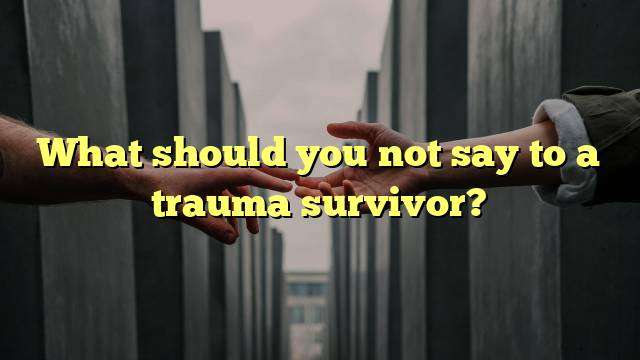Talking to a Trauma Survivor: What You Should and Should Not Say
The impact of trauma and the long-term effects it can have on a person can be difficult for some to understand. Therefore, it is important to be aware of the impact our words can have when talking to someone who has experienced trauma. Whether you are a family member, friend, or healthcare professional, there are certain things you should and should not say to a trauma survivor.
What You Should Say
When talking to a trauma survivor, it is important to be understanding and supportive. Here are some phrases that can help:
- I am here for you.
- I’m listening.
- I understand.
- It’s okay to feel overwhelmed.
- I believe you.
- It’s okay to take your time.
- You are strong.
- It’s okay to ask for help.
- You are not alone.
Sometimes the best thing to do is to simply be a listening ear. Let the person know that you are present and that you are open to discussing their experiences. It is important to make sure that you are not pushing the conversation too quickly and that the trauma survivor is comfortable.
What You Should Not Say
When talking to a trauma survivor, there are some phrases that could be seen as dismissive or belittling. Here are some phrases that you should avoid:
- It could not have been that bad.
- Stop being negative.
- If you continue dwelling on it, then you’ll never move on.
- Do you think you’ll ever stop being depressed?
- You’re a survivor, so quit being a victim.
- It could always be worse.
These phrases can be seen as minimizing the trauma survivor’s experience and can make them feel like their feelings are not valid. Instead, try to communicate understanding and empathy.
Taking the First Step to Healing
Talking to a trauma survivor can be a difficult conversation, but it is an important step in the healing process. It is important to be understanding and supportive, while avoiding comments that could be seen as dismissive or belittling. It is also important to remember that healing is a process and it will take time. Everyone heals differently and at their own pace. Therefore, it is important to be patient and understanding.
By providing a safe and supportive environment, you can help the trauma survivor feel comfortable and accepted. This can be a crucial part of the healing process and can help the trauma survivor move forward.
